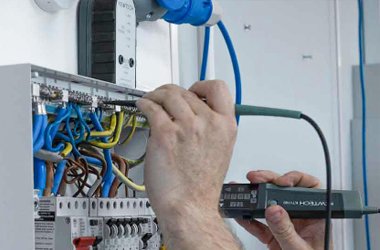Electrician Qualifications UK: The Complete Guide to Starting Your Career
If you’ve ever thought about becoming an electrician in the UK, you’ve probably asked yourself:
“What qualifications do I need?”
Whether you’re fresh out of school, switching careers, or simply curious about the trade, understanding electrician qualifications in the UK is the first step to success. In this guide, we’ll break down exactly what you need to get started, how long it takes, and the tools that can set you up for a thriving career — all in plain, straightforward language.
Why Electrician Qualifications Matter in the UK
Electrical work isn’t just about connecting wires — it’s about safety, compliance, and skill. In the UK, the right qualifications are essential not just for landing jobs but also for meeting legal requirements and earning customer trust.
Hiring managers, contracting companies, and even private clients often look for electricians with specific certifications. Without them, you might struggle to get insured, join professional schemes like NICEIC, or work on certain projects.
Minimum Electrician Qualifications in the UK
Before we explore advanced certifications, here are the minimum qualifications you’ll need to work as an electrician in the UK:
- Level 2 Diploma in Electrical Installation
- Often the starting point for anyone entering the trade.
- Covers the basics of electrical systems, safety, and installation techniques.
- Level 3 Diploma or NVQ Level 3 in Electrical Installation
- The industry standard for becoming a qualified electrician.
- Includes hands-on work experience and advanced theory.
- AM2 Assessment
- A practical skills test taken at the end of your training.
- Proves you can apply your knowledge safely in real-life scenarios.
Pro Tip: If you’re already working in the trade without formal qualifications, you can take an Experienced Worker Assessment to fast-track your NVQ Level 3.
How Long Does It Take to Qualify as an Electrician in the UK?
Most people take 3–4 years to fully qualify, usually through an apprenticeship that combines classroom learning with on-site work.
However, there are faster routes if you’re changing careers or studying full-time:
- Fast-Track Courses: Can be completed in 12–18 months but may cost more.
- Part-Time Training: Perfect for those balancing work and study, though it can take 4+ years.
Super Fast-Track Option for Aspiring Electricians
If you’re eager to qualify even quicker, there are special intensive courses designed to help you become a fully qualified electrician in the shortest possible time.
One example is the Qualified Electrician Course from WMD Electrical. This program combines essential training and assessments into a condensed schedule, allowing motivated learners to fast-track their NVQ Level 3 and AM2 preparation.
These courses are ideal if:
- You’re changing careers and want to start earning sooner.
- You can commit to an intensive, hands-on learning schedule.
- You’re willing to invest more upfront to save time in the long run.
Essential Skills Every Electrician Needs
Qualifications are vital, but skills make you stand out. UK electricians benefit from having:
- Problem-solving ability
- Good communication skills (especially for explaining work to clients)
- Attention to detail
- Strong understanding of safety regulations
And of course, having the right tools from day one can make a huge difference in your efficiency and professionalism.
The Tools and Products That Support Your Career
While your qualifications prove your knowledge, quality tools and equipment prove your capability. Here’s why:
- Testing Equipment ensures your installations meet UK safety standards.
- Insulated Hand Tools protect you and comply with workplace safety regulations.
- Organised Tool Storage helps you work faster and impress clients.
💡 If you’re just starting out, investing in a reliable tool kit can save you time and money in the long run. Explore our selection of electrician-approved gear to get everything you need in one go.
FAQs About Electrician Qualifications in the UK
Do I need GCSEs to become an electrician?
While not strictly necessary, most courses require at least GCSEs in Maths and English (grades 9–4/A*–C).
Can I become an electrician without qualifications?
You can work under supervision as a trainee, but to work independently and sign off on jobs, you’ll need at least an NVQ Level 3.
Are electricians in demand in the UK?
Yes — there’s a national shortage, and demand is expected to grow, especially in renewable energy sectors.
What’s the earning potential for electricians in the UK?
Qualified electricians often earn between £30,000–£40,000 per year, with self-employed professionals potentially making more.
How much does it cost to qualify?
Training costs vary from £3,000–£7,000 depending on the route you take.
Why the Right Gear Is as Important as Your Qualifications
Imagine turning up to a job with the right certifications but the wrong tools — you’ll waste time, look unprofessional, and potentially damage your reputation.
That’s why many newly qualified electricians choose to invest in their professional toolkit at the same time they earn their NVQ. From voltage testers to durable workwear, having reliable products from a trusted supplier means you can focus on the job, not your equipment.
Quick Tip: Buying tools in bundles or starter kits often saves money compared to purchasing items individually.
Conclusion: Your Path to Becoming a Qualified UK Electrician
The journey to becoming a qualified electrician in the UK starts with understanding the right qualifications — from your Level 2 and Level 3 diplomas to your AM2 assessment. If you want to get there faster, intensive programs like the Qualified Electrician Course from WMD Electrical can help you reach your goal sooner.
Alongside training, having the right tools and equipment will set you apart in a competitive market.
Ready to start your career with the right tools?
Shop Our Electrician Essentials Now →

